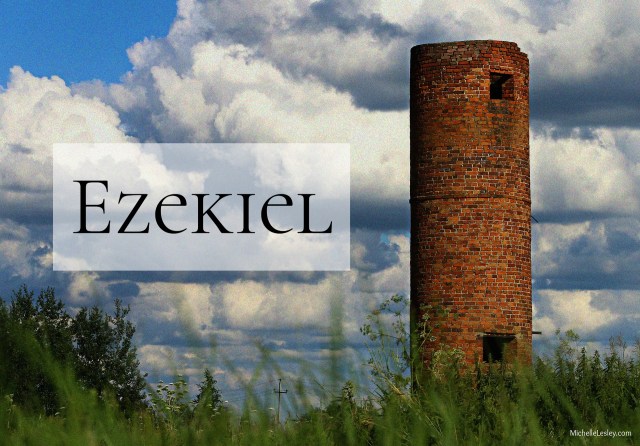
Previous Lessons: 1, 2, 3, 4, 5, 6, 7, 8, 9, 10
 Read Ezekiel 22-23
Read Ezekiel 22-23
![]()
Questions to Consider
1. Review your notes from last week’s lesson and be reminded of the things that lead into, and set the stage for, this week’s passage.
2. Read chapter 22.
Which city is “the bloody city”? (22:2) How did it earn this nickname? (22:3,4,6)
Make a list of every sin God charges people with in this chapter:
The People’s (Israel’s) Sin
The Princes’ Sin
The Prophets’ Sin
The Priests’ Sin
How does listing out these sins impact you? What impact should it have had on each of these groups of people for their sins to be publicly enumerated and exposed? How did God say the surrounding nations would regard Israel? (22:4-5,16) What was God’s desired end result in publicly shaming these groups of people? Is shame always a bad thing? Has feeling guilty or ashamed over a sin ever led you to repent of that sin?
3. Explain the dross metaphor in 22:17-22. Why do you think God’s wrath is so often compared to fire in Scripture?
4. Compare the false prophets and sinning priests in 22:25-28 to false teachers and wayward pastors today. What are some similarities and/or differences you see? What about false teachers (for example, Paula White) who advise governmental leaders (22:28)?
5. Take a moment and let 22:30 really sink in. When God searched for a righteous man to stand in the breach in Genesis 6, how many did He find? In Genesis 18-19? Read 2 Chronicles 16:9a. Contemplate the weight of Israel’s sin and the level of depravity they had sunk to as you consider that they were God’s covenant people – not pagans, as in the stories of Noah and Lot – and God could not find a single righteous person in their midst.
6. Read chapter 23. (Brace yourself, this chapter is not for the faint of heart. If you are doing this study with a younger child, you may want to read the chapter first and consider how you will address the adult themes it contains.)
Were Oholah and Oholibah real people, or is this story a parable/metaphor? (23:4b) What do each of the “sisters” represent? (23:4b)
Explain “Oholah’s” sin in your own words. (23:5-10)
Explain “Oholibah’s” sin in your own words. (23:11-21). How did Oholibah’s sin compare to Oholah’s sin? (23:11)
Why does God use such gross and explicit (yet, non-sinful) language to describe Samaria’s and Jerusalem’s sin? (23:5-21, 36-45) What does this teach us about how God views sin, and thus, how we should view sin? What was God’s response to their sin? (23:18) Consider the amount of sin Jesus bore in His body on the tree – far more than just the sins of chapter 23. How does God’s response to sin in 23:18 help you better understand Mark 15:34? Have you ever been as disgusted by your own sin as you were when you read the depiction of sin in chapter 23? Why or why not?
7. Describe the consequences 23:22-35, 46-49 spells out for Jerusalem and Samaria. Compare these consequences to the depiction of Jerusalem’s sin earlier in the chapter. Is God being unfair or punishing Jerusalem too harshly? What do these consequences tell us about how seriously God takes sin? Does God take your sin just as seriously as He took Jerusalem’s sin? Why or why not? If God was willing to execute judgment this extreme against sin on earth, what does that tell you about the judgment He will exercise against unbelievers in eternity? What does it tell you about the mercy and grace of God that Christ absorbed this extreme wrath and judgment against your sin in your place? Think about how you might convey these ideas to someone you’re sharing the gospel with.
8. Why does God consider idolatry to be spiritual adultery? (23:37) Have you ever considered your own sins of idolatry as spiritual adultery?
9. How should these horrific descriptions of sin, wrath, and judgment lead Christians to worship God and be thankful to Him?
Homework
• Add 22:16, 22 and 23:49 to your “And you/they shall know that I am the Lord” list. Write down who will know that He is the Lord, what will cause them to know He is the Lord, and why God wants them to know He is the Lord.
• Read my article Guilt and Shame- Burden or Blessing?, and consider any biblically appropriate or biblically inappropriate guilt and shame you may be experiencing, and what your godly response should be.
• Note how many times in these chapters that God talks about the sin of “disregarding” His Sabbaths. Compare this to Hebrews 10:24-25. Which principles (if any) regarding God’s wrath toward those disregarding His Sabbaths, apply to New Testament Christians forsaking the gathering of the church body?
Suggested Memory Verse


